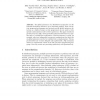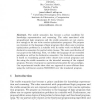3653 search results - page 50 / 731 » Learning of Partial Languages |
124
click to vote
ECOOPWEXCEPTION
2006
Springer
15 years 6 months ago
2006
Springer
Abstract. This paper shows that asynchronous fault detection is a practical way to reflect partial failure in a network-transparent distributed programming language. In the network...
123
click to vote
LOPSTR
2007
Springer
15 years 9 months ago
2007
Springer
Abstract. The goal of partial evaluation is the specialization of programs w.r.t. part of their input data. Although this technique is already well-known in the context of function...
131
click to vote
ESOP
2005
Springer
15 years 8 months ago
2005
Springer
Program slicing is a well-known methodology that aims at identifying the program statements that (potentially) affect the values computed at some point of interest. Within imperat...
120
click to vote
EUROPAR
2006
Springer
15 years 6 months ago
2006
Springer
Abstract. The global quiescence of a distributed computation (or distributed termination detection) is an important problem. Some concurrent programming languages and systems provi...
164
click to vote
AI
2001
Springer
15 years 6 months ago
2001
Springer
The stable semantics has become a prime candidate for knowledge representation and reasoning. The rules associated with propositional logic programs and the stable semantics are no...


